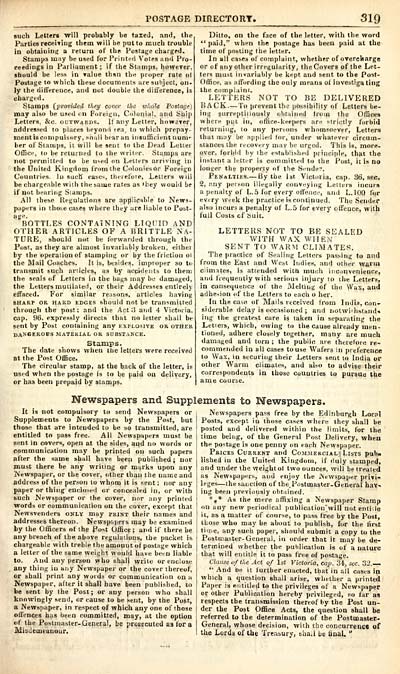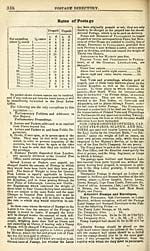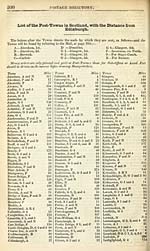Download files
Complete book:
Individual page:
Thumbnail gallery: Grid view | List view

POSTAGE DIRECTORY.
S19
Buch Letters "will probably be taxed, and, the
Parties receiving them will be put to much trouble
in obtaiiiins; a return of the Postage charged.
Stamps may be used tor Priiitpfi Votes and Pro-
ceedings in Parliament ; if the Stamps, hovyever,
should be less in Talue thsn th<! proper rate ol
Postage to which these documents uresuliject, on-
ly the diti'erence, and not double the ditference, is
chariled.
Stamps (provided they cover the whole Postagr)
may also be used i n Foreign, Cnloiiial, and Ship
Letters. &c. outwards. It' any Letter, hnwarer,
addressed to places lieyond fea, to which prepay-
mentis compulsory, shall bf-aran insufficient num--
her of Stamps, it will be sent to the Dead Lettei
Office, to be returned to the writer. Stamps are
not permitted to be used on Letters arriving in
the United Kingdom from the Colonies or Foreign
Countries, hi such cases, therefore, LelterH will
be chargeable with the same rates as ihey would be
if not bearing Stamps.
All these Regulations are apjJIicable to New.'!-
papcrs in thoke cases where they are liable to Post-
BOTTLES CONTAINING LlQIHn AND
OTHER ARTICLES OF A BRITTLE NA-
TURE, should not be forwarded through the
Post, as they are almost invariably broken, either
by the operation of stamping or by the friction ol
the Mail Coaches. It is, besides, improper so to
transmit such articles, as by accidents to them
the seals of Letters in the bags may be damaged,
the Letters mutilated, or their Addresses entirelv
effaced. For similar reasons, articles having
SHARP OR HARD EDGES should not be transmitted
through the post; and the Act;) and 4 Victoria,
cap. 96. expressly directs that no letter shall be
sent by Post containing any explosive or other
DANeEROBS MATERIAL OR SUBSTANCE.
Stamps.
The date shows when tlie letters were received
at the Post Office.
The circular stamp, at the back of the letter, is
used when the postage is to be paid on delivery,
or has been prepaid by stamps.
Ditto, on the face of the letter, with the word
" paid," when the postage has been paid at the
time of posting the letter.
In ail cases of complaint, whether of overcharge
or of any other irregularity, the Covers of the Let-
ters mu.st invariably be kept and sent to the Post-
Office, as atfording the ouly means ol investigating
the ccmpluint.
LETTERS NOT TO BE DELIVERED
BACK. — To prevent the possibility of Letters be-
ing surreptitiously obtnined troin the Offices
where ])ut in, office-keepers are .'trictly forbid
retuiiiing, to any persons whomsoever, Letters
that may be applieil lor, under whatever circum-
stances the recovery may be urged. This is, more-
over, forbid by the establislie<l principle, that the
instafit a letter is committed to the Post, it is no
lotiijer the property of the Sende-.
Penalties. — By the 1st Victoria, cap. 36, sec.
2, J'.ny persorj illegally convt'ying Letteis incurs
a penalty of L.5 for every otfeiice, and L.lOO for
every week the practice is continued. The Sender
also incurs a penalty of L.5 for every oiFence, with
full Costs of Suit,
LETTERS NOT TO BR SEALED
WITH WAX WHEN
SENT TO WARM CLIMATES.
The practice of Se.iling Letters passing to and
from the East and West IndieH, and other warm
ciimstes, is attended witti much inonvenience,
and liequeutiy with serious injury to the Letters,
in consequence of the Melting of tiie Wax, and
adhesion of the Letters to each o her.
In the case of Mails received from India, con-
siderable delay is occasioned ; and iiolwiihstands
ing the greatest care is taken in separating the
Letiers, which, owing to the cause already men-
tioned, adhere closely together, many are much
damaged and torn ; the public are therefore re-
commfuded in all cases to use Wafers in preference
to Wax, in securing their Letters sent to India or
other Warm climates, and also to advise their
correspondents in those countries to pursue the
ame course.
Newspapers and Supplements to Newspapers.
It is not compulsory to send Newspapers or
Supplements to Newspapers by the Post, but
those that are intended to be so transmitted, are
entitled to pass free. All Newspapers must be
sent in covers, open at the sides, and no words or
communication may be printed on such papers
after the same shall have been published; nor
must there be any writing or marks upon any
Newspaper, or the cover, other than the name anil
address of the person to whom it is sent ; nor any
paper or thing enclosed or concealed in, or with
such Newspaper or the cover, nor any printed
words or communication on the cover, except that
Newsvenders only may print their names and
addresses thereon. Newsp&pers may be examined
by the Officers of the Post Office ; and if there be
any breach of the above regulations, the packet is
chargeable with treble the amount of postage which
a letter of the same weight would have been liable
to. And any person who shall write or enclose
any thing in any Newspaper or the cover thereof,
or shall print any words or communication on a
Newspaper, after it shall have been published, to
be sent by the Post; or any person who shall
knowingly send, or cause to be sent, by the Post,
a Newspaper, in respect of which any one of those
offences has been committed, may, at the option
of the Postmaster-General, be proEecuted as fur a
Misdemeanour.
Newspapers pass free by the Edinburgh Locnl
Posts, except in those cases where they shall be
posted and delivered within the limits, for the
time being, of the General Post Delivery, when
the postage is one penny on each Newspaper.
Prices Current and Commercial; Lists paba
lished in the United Kingdom, if duly stamped,
and under the weight ot two ounces, will be treated
as Newspapers, and enjoy the xVewspaper privii
leges — the sanction of thePnstmaster-General hav-
ing been previously obtained.
*,* As the mere affixing a Newspaper Stamp
on any new periodical publication^will not entiile
it, as a matter of course, to pass free by the Post,
those who may be about to publish, for the first
tiine, any such paper, should submit a copy to the
I Postmaster- General, in order that it may be de-
I termined whether the publication is of a nature
that will entitle it to pass free of postage.
Clause of the Act of 1st Victoria, cap. 34, sec. 32.—
" And be it further enacted, that in all cases in
which a question shall arise, whether a printed
Paper is entitled to the privileges of a Newspaper
or other Publication hereby privileged, so far as
respects the transmission thereof by the Post un-
der the Post Office Acts, the question shall be
referred to the determination of the Postmaster-
General, whose decision, with the concurrence of
the Lords of the Treasury, shail be final. "
S19
Buch Letters "will probably be taxed, and, the
Parties receiving them will be put to much trouble
in obtaiiiins; a return of the Postage charged.
Stamps may be used tor Priiitpfi Votes and Pro-
ceedings in Parliament ; if the Stamps, hovyever,
should be less in Talue thsn th<! proper rate ol
Postage to which these documents uresuliject, on-
ly the diti'erence, and not double the ditference, is
chariled.
Stamps (provided they cover the whole Postagr)
may also be used i n Foreign, Cnloiiial, and Ship
Letters. &c. outwards. It' any Letter, hnwarer,
addressed to places lieyond fea, to which prepay-
mentis compulsory, shall bf-aran insufficient num--
her of Stamps, it will be sent to the Dead Lettei
Office, to be returned to the writer. Stamps are
not permitted to be used on Letters arriving in
the United Kingdom from the Colonies or Foreign
Countries, hi such cases, therefore, LelterH will
be chargeable with the same rates as ihey would be
if not bearing Stamps.
All these Regulations are apjJIicable to New.'!-
papcrs in thoke cases where they are liable to Post-
BOTTLES CONTAINING LlQIHn AND
OTHER ARTICLES OF A BRITTLE NA-
TURE, should not be forwarded through the
Post, as they are almost invariably broken, either
by the operation of stamping or by the friction ol
the Mail Coaches. It is, besides, improper so to
transmit such articles, as by accidents to them
the seals of Letters in the bags may be damaged,
the Letters mutilated, or their Addresses entirelv
effaced. For similar reasons, articles having
SHARP OR HARD EDGES should not be transmitted
through the post; and the Act;) and 4 Victoria,
cap. 96. expressly directs that no letter shall be
sent by Post containing any explosive or other
DANeEROBS MATERIAL OR SUBSTANCE.
Stamps.
The date shows when tlie letters were received
at the Post Office.
The circular stamp, at the back of the letter, is
used when the postage is to be paid on delivery,
or has been prepaid by stamps.
Ditto, on the face of the letter, with the word
" paid," when the postage has been paid at the
time of posting the letter.
In ail cases of complaint, whether of overcharge
or of any other irregularity, the Covers of the Let-
ters mu.st invariably be kept and sent to the Post-
Office, as atfording the ouly means ol investigating
the ccmpluint.
LETTERS NOT TO BE DELIVERED
BACK. — To prevent the possibility of Letters be-
ing surreptitiously obtnined troin the Offices
where ])ut in, office-keepers are .'trictly forbid
retuiiiing, to any persons whomsoever, Letters
that may be applieil lor, under whatever circum-
stances the recovery may be urged. This is, more-
over, forbid by the establislie<l principle, that the
instafit a letter is committed to the Post, it is no
lotiijer the property of the Sende-.
Penalties. — By the 1st Victoria, cap. 36, sec.
2, J'.ny persorj illegally convt'ying Letteis incurs
a penalty of L.5 for every otfeiice, and L.lOO for
every week the practice is continued. The Sender
also incurs a penalty of L.5 for every oiFence, with
full Costs of Suit,
LETTERS NOT TO BR SEALED
WITH WAX WHEN
SENT TO WARM CLIMATES.
The practice of Se.iling Letters passing to and
from the East and West IndieH, and other warm
ciimstes, is attended witti much inonvenience,
and liequeutiy with serious injury to the Letters,
in consequence of the Melting of tiie Wax, and
adhesion of the Letters to each o her.
In the case of Mails received from India, con-
siderable delay is occasioned ; and iiolwiihstands
ing the greatest care is taken in separating the
Letiers, which, owing to the cause already men-
tioned, adhere closely together, many are much
damaged and torn ; the public are therefore re-
commfuded in all cases to use Wafers in preference
to Wax, in securing their Letters sent to India or
other Warm climates, and also to advise their
correspondents in those countries to pursue the
ame course.
Newspapers and Supplements to Newspapers.
It is not compulsory to send Newspapers or
Supplements to Newspapers by the Post, but
those that are intended to be so transmitted, are
entitled to pass free. All Newspapers must be
sent in covers, open at the sides, and no words or
communication may be printed on such papers
after the same shall have been published; nor
must there be any writing or marks upon any
Newspaper, or the cover, other than the name anil
address of the person to whom it is sent ; nor any
paper or thing enclosed or concealed in, or with
such Newspaper or the cover, nor any printed
words or communication on the cover, except that
Newsvenders only may print their names and
addresses thereon. Newsp&pers may be examined
by the Officers of the Post Office ; and if there be
any breach of the above regulations, the packet is
chargeable with treble the amount of postage which
a letter of the same weight would have been liable
to. And any person who shall write or enclose
any thing in any Newspaper or the cover thereof,
or shall print any words or communication on a
Newspaper, after it shall have been published, to
be sent by the Post; or any person who shall
knowingly send, or cause to be sent, by the Post,
a Newspaper, in respect of which any one of those
offences has been committed, may, at the option
of the Postmaster-General, be proEecuted as fur a
Misdemeanour.
Newspapers pass free by the Edinburgh Locnl
Posts, except in those cases where they shall be
posted and delivered within the limits, for the
time being, of the General Post Delivery, when
the postage is one penny on each Newspaper.
Prices Current and Commercial; Lists paba
lished in the United Kingdom, if duly stamped,
and under the weight ot two ounces, will be treated
as Newspapers, and enjoy the xVewspaper privii
leges — the sanction of thePnstmaster-General hav-
ing been previously obtained.
*,* As the mere affixing a Newspaper Stamp
on any new periodical publication^will not entiile
it, as a matter of course, to pass free by the Post,
those who may be about to publish, for the first
tiine, any such paper, should submit a copy to the
I Postmaster- General, in order that it may be de-
I termined whether the publication is of a nature
that will entitle it to pass free of postage.
Clause of the Act of 1st Victoria, cap. 34, sec. 32.—
" And be it further enacted, that in all cases in
which a question shall arise, whether a printed
Paper is entitled to the privileges of a Newspaper
or other Publication hereby privileged, so far as
respects the transmission thereof by the Post un-
der the Post Office Acts, the question shall be
referred to the determination of the Postmaster-
General, whose decision, with the concurrence of
the Lords of the Treasury, shail be final. "
Set display mode to: Large image | Transcription
Images and transcriptions on this page, including medium image downloads, may be used under the Creative Commons Attribution 4.0 International Licence unless otherwise stated. ![]()
| Scottish Post Office Directories > Towns > Edinburgh > Post-Office annual directory and calendar > 1844-45 > (345) |
|---|
| Permanent URL | https://digital.nls.uk/87031068 |
|---|
| Description | Directories of individual Scottish towns and their suburbs. |
|---|
| Description | Around 700 Scottish directories published annually by the Post Office or private publishers between 1773 and 1911. Most of Scotland covered, with a focus on Edinburgh, Glasgow, Dundee and Aberdeen. Most volumes include a general directory (A-Z by surname), street directory (A-Z by street) and trade directory (A-Z by trade). |
|---|


